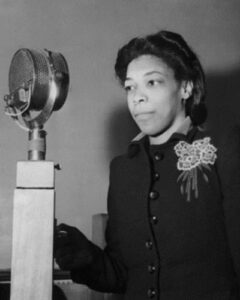
Una Marson
Una Maud Victoria Marson (6 February 1905 – 6 May 1965) was a Jamaican feminist, activist, and writer, producing poems, plays and radio programmes. She travelled to London in 1932 and became the first black woman to be employed by the BBC during World War II.
The Jamaican-born Marson received a colonial English public-school education at Hampton High School, passing the Oxford and Cambridge Board’s Lower Certificate in 1921. The West Indies had no university, and Marson relocated to Kingston to undertake social work training, moving soon after into journalism.
By 1926, at the age of 21, she was assistant editor of the monthly Jamaica Critic, and became Jamaica’s first woman-editor-publisher. Marson established The Cosmopolitan Monthly Magazine (1928–31), which focused upon issues concerning women’s economic and cultural status, while also publishing Jamaican poets at a time when this was rare, even in national newspapers.
Her involvement in pre-World War Two Jamaican life includes writing for The Daily Gleaner and The Jamaica Standard. She founded the Readers and Writers Club and Kingston Dramatic Club (1937) and established the Jamaican Save the Children Fund (1938). Her first published collection of lyrical poetry, sonnets and other miscellaneous poems, Tropic Reveries (1930) was self-financed. This was followed by her best-known collection, Heights and Depths (1931). Marson’s plays were staged both in Kingston and later, London.
During her first period of living in London (1932–36), where she initially lodged in Peckham, Marson joined the League of Coloured Peoples, editing and contributing poems to their journal The Keys. She was a delegate to the twelfth Congress of the International Alliance of Women for Suffrage and Legal Citizenship, a temporary collaborator to the League of Nations, and staff member of the Ethiopian Legation. Page 11 of 22
After a breakdown, she returned to Jamaica for two years and became re-immersed in politics, in which she continued to stress the role of Black women in the fight for freedom and socio-political change. During this period, her third poetry collection, The Moth and the Stars (1937) was published. This collection was galvanised by her experiences of living in London: both the racism she encountered and her engagement with Pan-Africanism. Her play Pocomania (Ward Theatre, 1938) was also produced and represented a breakthrough in Jamaican theatre, exploring the relationship between African-origin religious ritual forms, and cosmopolitan, creolised middle-class identities.
Returning to London in 1938, Marson became an influential broadcaster, journalist, and poet during the Blitz, working as a full-time assistant on the BBC radio programme Calling the West Indies first aired in 1939. She evolved it into the legendary Caribbean Voices that lasted from 1944 until 1958. In 1945, Marson experienced further ill health and returned to Jamaica, the year her final volume of poems Towards the Stars was published.
This pioneer in Caribbean media through her literary, dramatic, and polemical writing, together with her groundbreaking contributions to broadcasting, her anti-colonialist, anti-racist and feminist activism, mark her as a truly international figure in 20th-century history.
Una Marson was inducted posthumously into the CBU Caribbean Media Hall Of Fame in 2023.
